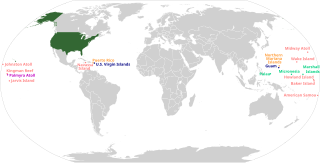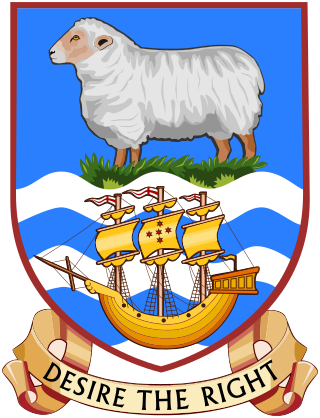A constitutional amendment is a modification of the constitution of a polity, organization or other type of entity. Amendments are often interwoven into the relevant sections of an existing constitution, directly altering the text. Conversely, they can be appended to the constitution as supplemental additions, thus changing the frame of government without altering the existing text of the document.

The 51st state is a term in American political discourse that refers to areas considered to be candidates for U.S. statehood, joining the 50 United States existing since 1959. The phrase has been applied to external territories, as well as the country's capital for the District of Columbia and parts of already-existing states which would be admitted as separate states in their own right.

Referendums in the United Kingdom are occasionally held at a national, regional or local level. Historically, national referendums are rare due to the long-standing principle of parliamentary sovereignty. There is no constitutional requirement to hold a national referendum for any purpose or on any issue however the UK Parliament is free to legislate through an Act of Parliament for a referendum to be held on any question at any time, but unless it is strictly legislated for these cannot be constitutionally binding on either the Government or Parliament, although they usually have a persuasive political effect.
In the United States, each state has its own written constitution.

This is a list of referendums related to the European Union, or referendums related to the European Communities, which were predecessors of the European Union. Since 1972, a total of 48 referendums have been held by EU member states, candidate states, and their territories, with several additional referendums held in countries outside the EU. The referendums have been held most commonly on the subject of whether to become a member of European Union as part of the accession process, although the EU does not require any candidate country to hold a referendum to approve membership or as part of treaty ratification. Other EU-related referendums have been held on the adoption of the euro and on participation in other EU-related policies.
The current Constitution of the State of Maryland, which was ratified by the people of the state on September 18, 1867, forms the basic law for the U.S. state of Maryland. It replaced the short-lived Maryland Constitution of 1864 and is the fourth constitution under which the state has been governed. It was last amended in 2022.
In Australia, referendums are public votes held on important issues where the electorate may approve or reject a certain proposal. The term is commonly used in reference to a constitutional referendum which is legally required to make a change to the Constitution of Australia.

The Constitution of the State of Texas is the document that establishes the structure and function of the government of the U.S. state of Texas, and enumerates the basic rights of the citizens of Texas.
The Constitution of the State of Ohio is the basic governing document of the State of Ohio, which in 1803 became the 17th state to join the United States of America. Ohio has had three constitutions since statehood was granted.
Referendums in Taiwan at both the national and local level are governed by the Referendum Act of Taiwan, which was enacted by the Legislative Yuan in December 2003. Citizens can propose laws via referendums at the national and local levels. The Referendum Act also allowed people to make changes or abolish laws by referendums.

The Constitution of Liberia is the supreme law of the Republic of Liberia. The current constitution, which came into force on 6 January 1986, replaced the Liberian Constitution of 1847, which had been in force since the independence of Liberia. Much like the 1847 Constitution, the Constitution creates a system of government heavily modeled on the Federal Government of the United States.
Six referendums were held in Switzerland during 2010; three in March on pension funds, animal protection and a constitutional amendment, one in September on unemployment benefits, and two in November on deporting foreign criminals and introducing a canton tax.

A constitutional referendum was held in American Samoa on November 2, 2010, on the same day of the United States House of Representatives election and American Samoan general election.

A constitutional referendum was held in the Northern Mariana Islands on 2 November 2010, alongside the election for the islands' representative to the United States House of Representatives. Voters were asked whether they approved of three proposed amendments to the constitution. All three were rejected.

A constitutional referendum was held in Peru on 25 August 1919. The proposed reforms were approved by voters.

A constitutional referendum was held in the United States Virgin Islands on 6 March 1979. Federal law passed by the United States Congress authorized the Virgin Islands and Guam to pass constitutions and form governments. A Constitutional Council had subsequently been elected in the 1977 general elections. The Council wrote and then unanimously adopted a draft constitution which provided for an elected governor and treasurer, a 17-seat Legislature, a local justice system and protections for Virgin Islander culture.
A referendum is a direct vote in which an entire electorate is asked to either accept or reject a particular proposal. This article summarises referendum laws and practice in various countries.

A referendum on statehood for the District of Columbia was held on November 8, 2016. It was the first referendum on statehood to be held in the district. The District of Columbia was created following the passage of the Residence Act on July 9, 1790, which approved the creation of a national capital, the City of Washington on the Potomac River.

A referendum on reforming the electoral system was held in the Falkland Islands on 24 September 2020, after being postponed from 26 March 2020 following the Coronavirus pandemic. Voters were asked if they wanted to replace the two existing electoral constituencies with a single constituency for the whole of the Islands. Although a majority of those who voted supported the change, the required two-thirds majority in both of the islands' constituencies was not achieved.

A referendum on holding a constitutional convention was held in the US Virgin Islands on 3 November 2020 alongside general elections. 72% of voters responding to the referendum question voted in favor and turnout was above the threshold required.











